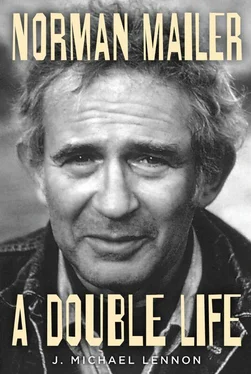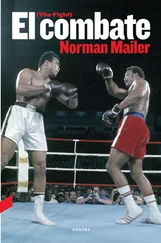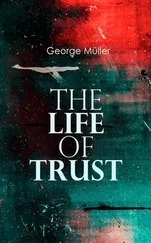One of the last stories he wrote his freshman year, “Life Is Where You Find It,” concerns an eighteen-year-old Harvard student, Hal Stewart, a would-be writer who wants to go hitchhiking in the summer to find “some cheap tail.” When he returns to school, Hal realizes that he will have to face a choice: “whether he’d be a writer or an engineer.” Mailer was not ready to tell his family that he was approaching this same crossroad. That announcement would have to wait until such a time as he could produce some literary bona fides. It was still understood by the family that he was preparing for a career designing airplanes, although shortly after he arrived at Harvard he must have recognized that his degree would be in a general engineering program (engineering sciences), as Harvard did not have an aeronautical engineering program, merely a few courses. Further complicating matters was the fact that he had not taken high school Latin, which was required for a bachelor of arts degree at Harvard, and so could not change his major to English, although he talked to his friends about doing so.
Another issue was money. He had entered Harvard with the understanding that his parents would, by whatever means (including help from Uncle Dave and Aunt Anne), find the money for his first year’s college expenses, $1,200, a huge sum for a family with a sporadically employed father. On his application he had put down $3,000 as total family income for the year, supplemented by the $60 he claimed he would earn as a summer counselor at the Scarboro Hotel. For his part, he agreed to apply himself to his studies so as to be eligible for a scholarship in his sophomore year. This meant getting on the dean’s list, which he accomplished by getting three Bs and an A (in Mathematics, the subject in which he always scored highest). His family was happy with his performance but, apparently, these grades weren’t high enough, for in July he was informed that his scholarship application had been turned down. Another disappointment was not getting into one of Harvard’s residential houses for his sophomore year. He and Sy Breslow applied for a suite in Dunster House, with Adams as a backup, and were rejected for both. Marty Lubin was also turned down, and the three friends decided to share a suite in one of the dormitories, Claverly Hall.
Mailer went to Long Branch for the summer to write. Over the next ten weeks, holed up with his portable Remington in the Scarboro Hotel room provided by Aunt Beck, he wrote eight short stories, all of which he would submit the following year. This would be the pattern for three successive summers: write during the summer and bank the work for the fall, a routine that enabled him to tackle ever more ambitious projects. He also wanted to roam and gain experience, especially sexual experience, something that was hard to obtain in Long Branch where there were too many sharp-eyed cousins. In August he and a summer friend decided to hitchhike 125 miles to Scranton where, they had learned from college chums, there was an entire street of brothels. Mailer anticipated this experience in “Love Is Where You Find It” and captured it retrospectively in another short story, titled “Love-Buds,” written his senior year but never submitted as class work. In 2007 he referred to the experience as “the disaster of Scranton.” In the short story Eppy is Mailer.
They set off with toothbrushes, clean underwear, chocolate bars and some apples, more like Huck and Tom than red-eyed Lotharios. Both are seventeen-year-old virgins and “privately, they were each convinced they would die without having known a woman.” The story ends this way:
“How was it?” Eppy asked tentatively.
“It was wonderful,” said Al.
“Yeah, just wonderful.”
“Were you able to do it?” Al squeeked.
“No. Were you?”
“No.”
By the admission, each had somehow saved the honor of the other. Al let out a whoop of laughter, and Eppy pummeled him on the back. They laughed, they hugged one another, they jumped up and down on the city street beneath the light of a street lamp, and roared with laughter at themselves and each other.
IN THE FALL of 1940, Mailer signed up for required courses in engineering, math, and physics and one full-year elective: English 1-A, a creative writing course taught by Robert Gorham Davis. An active communist and a member of Matthiessen’s clique, the WASPish Davis later wrote short stories for The New Yorker. Armed with his cache of stories written over the summer, Mailer impressed Davis, who was exactly the mentor he needed at this stage of his life, although their relationship almost foundered at its start. He submitted “He Was Her Man,” a 1,400-word story, and Davis selected it to read in part to the class of approximately fifty students. A businessman and his wife are staying at a resort hotel and when he leaves on a trip, she invites a bellboy to her room. The man returns unexpectedly and finds his wife in bed with him and shoots her in the back of her head. When another bellboy gets to the room, the first one having fled, he finds blood and brains splattered everywhere. After shooting his wife, the man shot himself. “I could make out where her eyes and mouth had been, but I wondered what had happened to her nose. I couldn’t guess whether it was smashed into the carpet, or if it was still floating around. I hoped it was in the ground, because stepping on it was certainly better than breathing it in.”
At this point, the class broke up. “I can’t tell you how my back was scalded by the laughter,” Mailer said. But the next day Davis apologized to him, and the relationship was repaired and strengthened. He got a C— on the story, which Davis said in his written comments was “just a mash of brains and nausea.” Mailer remembered the grade to be an A—, but his error is clearly a tribute to the man who helped launch his writing career.
In his sophomore year he read Thomas Wolfe and said that Wolfe “made the biggest dent,” although his influence was not apparent until later. He also read Saroyan, Faulkner, Fitzgerald, and Hemingway. Sy Breslow said that Mailer kept a gin bottle on his mantel because he read that Hemingway drank it. Papa’s macho athleticism and his adventures in the Spanish Civil War were well known and he tried to emulate him. Friends remember the skinny kid from Brooklyn shadow boxing and pretending to be Rocky Graziano. His shyness began to fall away. Along with his friend Larry Weiss, who also lived in Claverly Hall, he tried out for the house football team. Mailer, who was a fan of contact sports, but not much of a participant, made the team, while Weiss did not. The team wore pads and uniforms, but only fourteen or fifteen players showed up for any one game and, except for the running backs, everyone played both offense and defense for the full forty-eight minutes. “I weighed 135 pounds then and played the line: running guard on offense, cannon fodder on defense. And I had fun.” Mailer talked proudly about playing house football at Harvard many times over the years; it was a significant milestone.
His virginity weighed heavy, especially after the Scranton disaster. As he wrote later, he had “accepted Lawrence’s thesis about untrammeled and illimitable rights and liberties and pleasures of sexual love,” but alas, alack, no partner was to be found. Phyllis Bradman came up to Cambridge once each semester, but he never progressed beyond first or second base with her, in Brooklyn parlance. At the end of his freshman year Harold Marantz had introduced him to a young woman who might solve his problem, as she had solved Marantz’s. Mailer began seeing her and resumed the seduction when he returned for sophomore year, traveling once a week to her home in Cambridge. “She was too plain to take out,” he said, “I would have been embarrassed.” After a few visits, he got to third base. “I remember I had not washed my hands, purposely. And I walked by one of my sleeping roommates, put my fingers under his nose and said, ‘Whiff that.’ That was exactly the level of our social discourse in those days.”
Читать дальше












